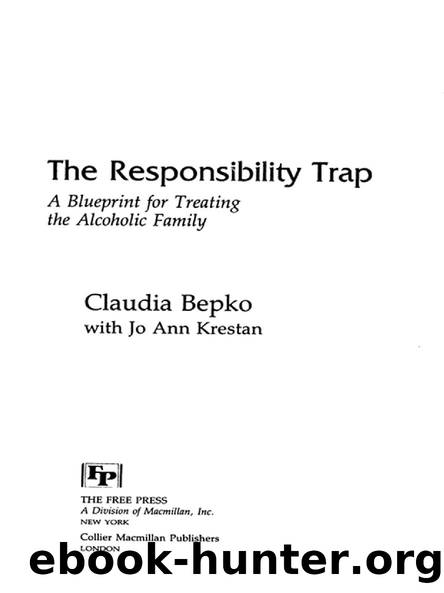The Responsibility Trap by Claudia Bepko

Author:Claudia Bepko
Language: eng
Format: epub
Publisher: THE FREE PRESS
Published: 1985-07-15T00:00:00+00:00
Because the norm is that the female has responsibility for the emotional functions in the family, the male is typically less disturbed by guilt about the effects of his drinking on the family. He is more likely to feel guilt about his failure to be a good provider if he has become unemployed as a result of his drinking and he tends to focus more after sobriety on this aspect of his functioning than on the emotional damage his drinking has caused. The male may tend to overfunction at work or in a new job after sobriety and the pressures he imposes on himself can often threaten his new-found sobriety.
For the woman, AA attendance and the work of achieving sobriety have a much greater effect on the family and a much greater impact on self-esteem. The family has typically not reorganized around a woman’s drinking so much as it has simply defined her as bad or crazy. Much of her drinking may have occurred at home, and she usually continued to function, if minimally, as housewife and mother. When the woman becomes sober, she must face at least two dilemmas: particularly if she works, how can she find the time and how can she disrupt the family by leaving frequently to attend meetings—and how does she deal with the resentment of her spouse and children at her absence? Secondly, how does she cope with the guilt surrounding her past failure to meet some of the physical and emotional needs of her family? To function poorly at being an emotional caretaker represents an absolute kind of failure to a woman and her postsobriety guilt tends to be more intense than her male counterpart’s. She may respond to her guilt by reverting to an overresponsible role with her children. If this shift doesn’t threaten her own sobriety, it may set the stage for alcohol abuse in one or more of her children. For the woman, the achievement of sobriety in itself challenges the fundamental premises of the relationship relative to sex roles. It acknowledges her status as a “drunk”—a role less acceptable for a woman than for a male because it is defined stereotypically as “male” behavior, and it requires a direct focus on self in terms of the time and work required to sustain sober behavior. In general, the family will typically react more negatively to a female’s drinking behavior as well as to her attempts to be sober, simply because they represent a radical departure from the expected norms for female functioning.
Phase 3: Maintaining Sobriety—Rebalancing the System
In Phase 3, the alcoholic has been sober for at least six months but more ideally for one to two years. He may or may not have had periodic relapses to drinking. He expresses discomfort either with the marital relationship or with family problems involving the children. He may be experiencing acute depression or may be having difficulty maintaining sobriety despite contact with AA or other after-care treatment.
The family may continue to struggle with role adjustments more characteristic of Phase 2.
Download
This site does not store any files on its server. We only index and link to content provided by other sites. Please contact the content providers to delete copyright contents if any and email us, we'll remove relevant links or contents immediately.
| Adult Children of Alcoholics | Alcoholism |
| Drug Dependency | Gambling |
| Hoarding | Obsessive Compulsive Disorder (OCD) |
| Sexual | Smoking |
| Substance Abuse | Twelve-Step Programs |
The Hacking of the American Mind by Robert H. Lustig(4383)
Right Here, Right Now by Georgia Beers(4212)
Fingerprints of the Gods by Graham Hancock(4004)
Goodbye Paradise(3810)
Bad Pharma by Ben Goldacre(3428)
Happiness by Matthieu Ricard(3048)
The Social Psychology of Inequality by Unknown(3031)
More Language of Letting Go: 366 New Daily Meditations by Melody Beattie(3030)
The Plant Paradox by Dr. Steven R. Gundry M.D(2620)
Drugs Unlimited by Mike Power(2594)
Confessions of a Shopaholic by Sophie Kinsella(2372)
Borders by unknow(2315)
Make Love Not Porn by Cindy Gallop(2105)
Dry by Augusten Burroughs(2101)
Stop Being Mean to Yourself: A Story About Finding the True Meaning of Self-Love by Melody Beattie(2004)
Getting Off by Erica Garza(1932)
Belonging by Unknown(1857)
Yoga and the Twelve-Step Path by Kyczy Hawk(1835)
Unmasking Male Depression by Archibald D. Hart(1808)
